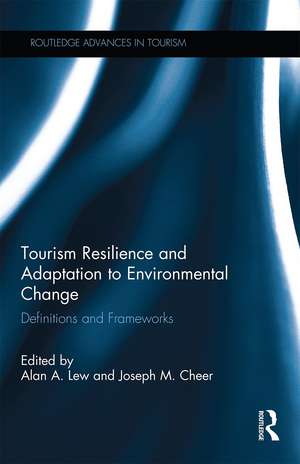Tourism Resilience and Adaptation to Environmental Change: Definitions and Frameworks: Routledge Advances in Tourism
Editat de Alan A. Lew, Joseph M. Cheeren Limba Engleză Paperback – 30 sep 2020
Drawing on original empirical and theoretical insights in resilience thinking, this book explores how tourism communities and economies respond to environmental changes, both fast (natural hazard disasters) and slow (incremental shifts). It explores how tourism places adapt, change, and sometimes transform (or not) in relation to their environmental context, with an awareness of intersection with societal dynamics and links to political, economic and social drivers of change. Contributions draw on empirical research conducted in a range of international settings, including indigenous communities, to explore the complexity and gradations of environmental change encounters and resilience planning responses in a range of tourism contexts.
As the first book to specifically focus on environmental change from a resilience perspective, this timely and original work makes a critical contribution to tourism studies, tourism management and environmental geography, as well as environmental sciences and development studies.
Din seria Routledge Advances in Tourism
-
 Preț: 319.24 lei
Preț: 319.24 lei -
 Preț: 349.17 lei
Preț: 349.17 lei -
 Preț: 319.01 lei
Preț: 319.01 lei -
 Preț: 436.14 lei
Preț: 436.14 lei -
 Preț: 471.25 lei
Preț: 471.25 lei - 25%
 Preț: 828.48 lei
Preț: 828.48 lei - 18%
 Preț: 1000.30 lei
Preț: 1000.30 lei -
 Preț: 491.68 lei
Preț: 491.68 lei - 30%
 Preț: 848.55 lei
Preț: 848.55 lei -
 Preț: 413.72 lei
Preț: 413.72 lei -
 Preț: 439.85 lei
Preț: 439.85 lei - 18%
 Preț: 1056.32 lei
Preț: 1056.32 lei -
 Preț: 492.53 lei
Preț: 492.53 lei - 18%
 Preț: 1001.84 lei
Preț: 1001.84 lei -
 Preț: 410.66 lei
Preț: 410.66 lei -
 Preț: 389.27 lei
Preț: 389.27 lei -
 Preț: 420.34 lei
Preț: 420.34 lei -
 Preț: 479.51 lei
Preț: 479.51 lei -
 Preț: 364.94 lei
Preț: 364.94 lei -
 Preț: 409.13 lei
Preț: 409.13 lei -
 Preț: 388.42 lei
Preț: 388.42 lei -
 Preț: 449.63 lei
Preț: 449.63 lei - 13%
 Preț: 309.58 lei
Preț: 309.58 lei - 60%
 Preț: 487.89 lei
Preț: 487.89 lei -
 Preț: 487.86 lei
Preț: 487.86 lei -
 Preț: 445.38 lei
Preț: 445.38 lei -
 Preț: 418.94 lei
Preț: 418.94 lei - 30%
 Preț: 845.69 lei
Preț: 845.69 lei - 18%
 Preț: 1061.93 lei
Preț: 1061.93 lei - 69%
 Preț: 445.64 lei
Preț: 445.64 lei - 62%
 Preț: 422.28 lei
Preț: 422.28 lei - 18%
 Preț: 1379.09 lei
Preț: 1379.09 lei - 55%
 Preț: 496.87 lei
Preț: 496.87 lei
Preț: 261.33 lei
Preț vechi: 319.65 lei
-18% Nou
Puncte Express: 392
Preț estimativ în valută:
50.01€ • 54.31$ • 42.01£
50.01€ • 54.31$ • 42.01£
Carte tipărită la comandă
Livrare economică 22 aprilie-06 mai
Preluare comenzi: 021 569.72.76
Specificații
ISBN-13: 9780367667665
ISBN-10: 0367667665
Pagini: 342
Dimensiuni: 156 x 234 x 33 mm
Greutate: 0.52 kg
Ediția:1
Editura: Taylor & Francis
Colecția Routledge
Seria Routledge Advances in Tourism
Locul publicării:Oxford, United Kingdom
ISBN-10: 0367667665
Pagini: 342
Dimensiuni: 156 x 234 x 33 mm
Greutate: 0.52 kg
Ediția:1
Editura: Taylor & Francis
Colecția Routledge
Seria Routledge Advances in Tourism
Locul publicării:Oxford, United Kingdom
Public țintă
Postgraduate and UndergraduateCuprins
Part 1: Introduction 1. Environmental change, resilience and tourism: Definitions and frameworks 2. Applying the adaptive capacity cycle to tourism development: An exploration of socio-social-ecological resilience 3. The sustainable and resilient community: A new paradigm for community development Part 2: Nature-Based Tourism & Climate Change 4. Searching for resilience: Seal watching tourism as a resource for community development in Iceland 5. Tourism development and resilience in small oceanic islands in Australia and Brazil 6. Ecotourism, climate change, and rural resilience in Trinidad and Tobago 7. Cultural ecosystem services, tourism, and community resilience in coastal wetland conservation in Taiwan 8. Managing for resilience in the face of climate change: The adaptive capacity of U.S. ski areas 9. (Re)production of resilient tourism space in the context of climate change in coastal Québec, Canada 10. A resilience approach to understanding collaborative coral reef conservation on Gili Trawangan, Indonesia Part 3: Disasters Events and Tourism 11. Disaster resilience of small businesses in Guanxian ancient town, Sichuan, China 12. Death and disaster as moments of liminality: Towards collective agency and community resilience in Solukhumbu, Nepal 13. Tourism and the psychologically resilient city: Christchurch after the earthquake 14. Restoring spiritual resilience in post-disaster recovery in Fukushima 15. Fast and slow resilience in the New Zealand tourism industry Part 4: Indigenous Responses To Changing Environments 16. Within the changing system of Arctic tourism, what should be made resilient to what, and for whom? 17. Conceptualizing destinations as a Vanua: An examination of the evolution and resilience of a Fijian social and ecological system Part 5: Conclusions 18. Lessons learned: Tourism and the Anthropocene
Notă biografică
Alan A. Lew is a professor in the Department of Geography, Planning, and Recreation at Northern Arizona University, USA where he teaches in geography, urban planning, and tourism. His research interests focus on tourism in the Asia-Pacific region, particularly in East and Southeast Asia. He is the founding editor-in-chief of the journal, Tourism Geographies, a Fellow of the International Academy for the Study of Tourism, and a member of the American Institute of Certified Planners.
Joseph M. Cheer is a lecturer at the National Centre for Australian Studies (NCAS), Monash University and directs the activities of the Australia and International Tourism Research Unit (AITRU). His research draws from transdisciplinary perspectives, especially human geography, cultural anthropology and political economy with a focus on the Asia-Pacific region. He is focused on research-to-practice with an emphasis on resilience building, sustainability and social justice.
Descriere
Resilience lies at the core of understanding the adaptive capacity of people and places in complex socio-environmental systems. Tourism Resilience and Adaptation to Environmental Change draws on original empirical and theoretical insights to explore how tourism communities and economies respond to environmental change
